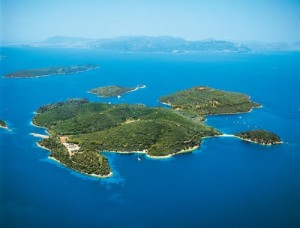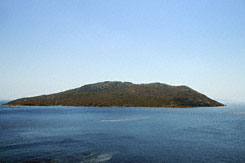Throughout Greece’s ongoing financial crisis, rumors that the country is considering selling off its treasured islands to foreigners have been rampant in the media.
What makes the idea of owning a Greek island so captivating? Of course, the rocky, desert isles in the deep blue Mediterranean have an aching beauty, and there’s no shortage of exciting party spots a yacht trip away on main islands like Crete, Mykonos and Kos. Aristotle Onassis popularized the very idea of owning a private island when he spirited Jackie-O to his remote Skorpios in the 1960’s. But there has to be something more – after all, there are plenty of fun, beautiful islands in the world.
Maybe the allure comes from the longing for that which is out of reach – and in Greece, islands are certainly that. Despite the country’s devastating economic collapse, prices of Greek islands continue to rise unabated. One such property, as reported in the Wall Street Journal Wealth Advisor, was recently listed by an agency based in Crete with a price tag of €180 million. Even with 404 hectares, lush olive groves, and at least one nice beach, it’s difficult to imagine the island changing hands for that amount.
According to Pedro Arez, Senior Vice-President of top island brokerage and travel firm Vladi Private Islands, the asking amount is not realistic, and symptomatic of a wider issue with pricing in the Greek market. “Greek sellers really need to bring their prices down if they want a sale,” he was quoted as saying in the WSJ article.
Even for those with deep pockets, Greek islands can be a mirage. A recent article in the Greek Reporter newspaper describes how an unnamed Canadian billionaire and the wealthy Lebanese businessman Antoine Maalouf have both vied to purchase the 1000-acre island of Patroklos for resort development. Maalouf, together with a consortium of investors, was prepared to pay €120 million for the property, and investment billions more in a development that would create thousands of jobs.
Maalouf’s promising deal eventually was stalled, and died on the vine due to a perennial Greek problem: bureaucracy. For many reasons, including national security concerns in border areas and heavy environmental restrictions, ownership of Greek islands is simply a far more difficult endeavor for foreigners than citizens. While not strictly forbidden, the layers of Byzantine red tape non-Greek nationals must navigate provides a de facto barrier, as PIN has reported in the past (link).
Gratifying to long-time watchers of the island market, the excellent piece in the Wall Street Journal looks past the media hype to the truth about what it takes for a non-citizen to buy a Greek island, although the answer will dismay those who harbour the dream of a Skorpios to call their own. While nothing is impossible, as it stands now, potential buyers of Greek isles will need to come to the table armed with both plenty of liquid cash, and an even bigger reserve of patience.
Read more about this story: Wall Street Journal/a>




